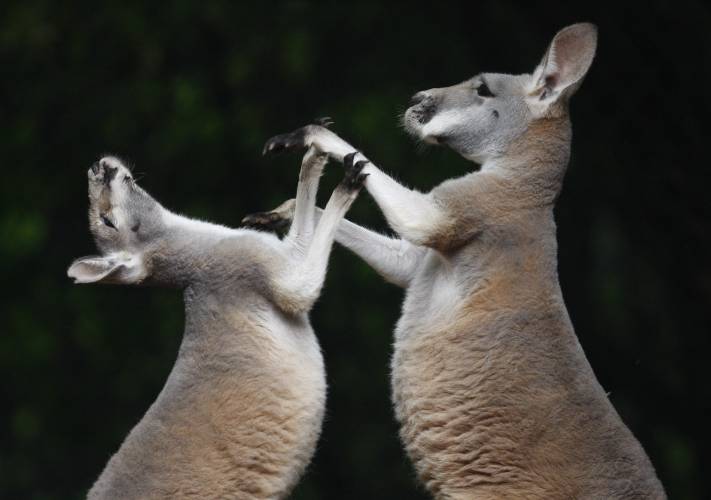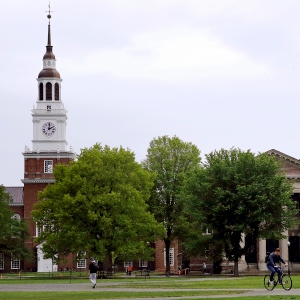Kangaroos in the Granite State? A roo-volution begins

Zwei Kaenguruhs boxen am Freitag, 15. August 2008, in ihrem Gehege im Zoo Hannover. (AP Photo/Axel Heimken) Two kangaroos box in the zoo in Hanover, northern Germany on Friday, Aug. 15, 2008. (AP Photo/Axel Heimken) Axel Heimken
| Published: 11-09-2023 4:05 PM |
Among the many global controversies that will be pondered by New Hampshire legislators this year is a surprising one: Should we eat kangaroos?
Two bills regarding Australia’s iconic megafauna have been introduced. One would remove kangaroos as well as a few other exotic species from the list of animals that cannot be raised privately, and the other would let people sell kangaroo meat as well as caribou meat.
This comes even as Oregon and Connecticut are considering whether to follow California’s lead and ban the sale of kangaroo meat, hides and other components The push, which argues that Australia’s kangaroo farming industry is inhumane, focuses not so much on kangaroo meat as on their hides, which are imported for use in some athletic shoe manufacturing. That makes the proposed ban in Oregon, home to global shoe giant Nike, especially intriguing.
The New Hampshire push comes from a group called Free State Food Network, whose goals echo the terminology of the Free State Project including talk of “freedom-minded people” and advocating against government involvement.
The group argues that allowing small-scale raising of kangaroos for meat would contribute to food security and give farmers “a sustainable source of income through the sale of meat and other kangaroo-related products.”
A proposed bill from Rep. Tom Mannion, R-Pelham, would allow private ownership of kangaroos, as well as “small tailed monkeys, raccoons, foxes, otters, [and] skunks.”
New Hampshire, like all states, has a list of creatures – mammals, fish, birds, reptiles, amphibians, even insects – that cannot be owned privately or sold, although some exceptions are allowed such as for zoos and museums. Most creatures are on the list either to protect them from being wiped out by collectors, or to protect us because they would become a problem if they escaped.
Because they evolved in a hot, arid continent, kangaroos are not well adapted to cold climates. They can survive for a time in the cold, even during the rare snowfalls that are seen in parts of coastal Australia, but there is no area of that country which has New England’s climate.
Article continues after...
Yesterday's Most Read Articles
 Franklin police arrest man after accidental shooting Wednesday
Franklin police arrest man after accidental shooting Wednesday
 Update: Reactions for, against the more than 100 arrested at Dartmouth, UNH
Update: Reactions for, against the more than 100 arrested at Dartmouth, UNH
 Kenyon: What makes Dartmouth different?
Kenyon: What makes Dartmouth different?
 Concord High graduate leads Pro-Palestine protests at Brown Univeristy
Concord High graduate leads Pro-Palestine protests at Brown Univeristy
 High schools: Wednesday’s baseball, softball, lacrosse and tennis results
High schools: Wednesday’s baseball, softball, lacrosse and tennis results
 Spring sprouts downtown: outdoor dining, farmers market, First Friday
Spring sprouts downtown: outdoor dining, farmers market, First Friday
A separate proposed bill from Rep. Michael Granger, R-Milton Mills, would allow the private sale of kangaroo and caribou meat. The question of which foods can be sold privately under what conditions has been debated for many years in New Hampshire.
Kangaroos are marsupials, unlike all American animals except for the possum, and from the ecological point of view they are basically deer that hop; that’s the niche they fill in Australia.
Kangaroos cannot be fully domesticated but they have long been corralled and raised on ranches Down Under, similar to the way deer, elk and caribou are raised on farms in North America. Australia also has occasional official culls of wild kangaroos which, like deer, are proliferating near urban areas.
Kangaroo meat is a small but well-established part of the Australian diet, roughly similar to the role that venison plays in the U.S. diets.


 Jurors hear closing arguments in landmark case alleging abuse at New Hampshire youth center
Jurors hear closing arguments in landmark case alleging abuse at New Hampshire youth center Voice of the Pride: Merrimack Valley sophomore Nick Gelinas never misses a game
Voice of the Pride: Merrimack Valley sophomore Nick Gelinas never misses a game With less than three months left, Concord Casino hasn’t found a buyer
With less than three months left, Concord Casino hasn’t found a buyer
